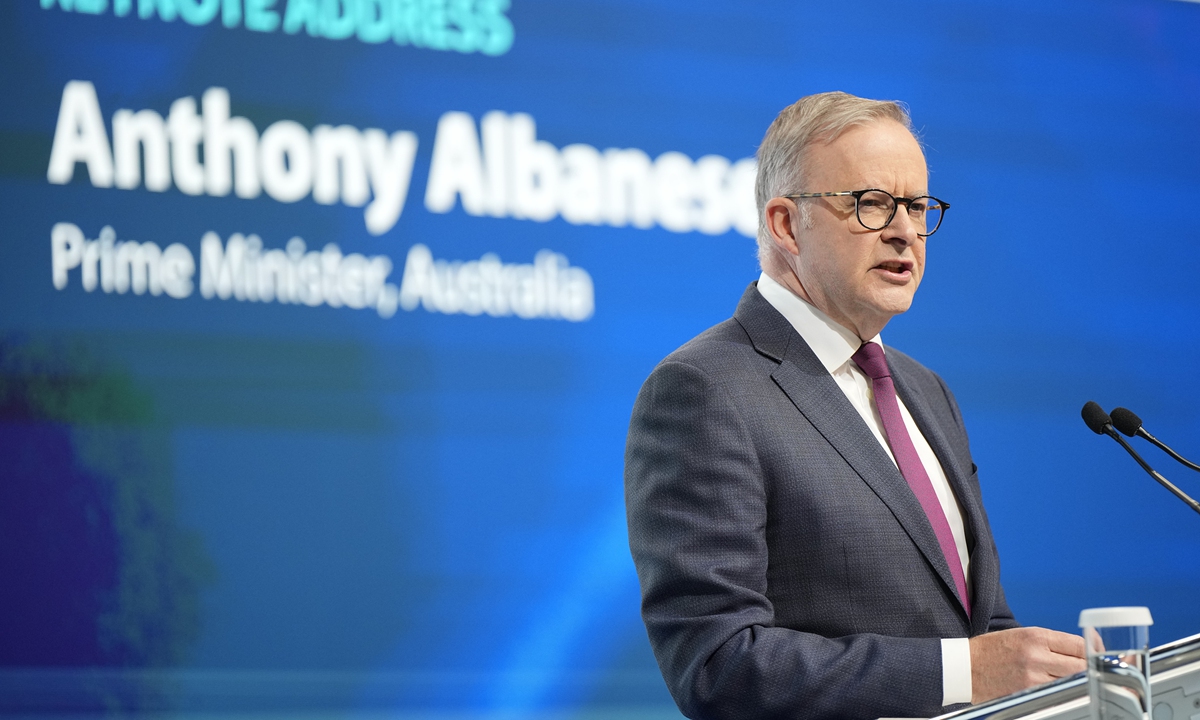
Photo: CFP
In Australian Prime Minister Anthony Albanese's keynote speech at the 20th IISS Shangri-La Dialogue, delivered on Friday evening, the tone toward is China was noticeably less shrill, compared with opening addresses at the event over recent past years. A delegate of the Chinese People's Liberation Army (PLA) said the remarks were completely reasonable as Australia has been committed to improving its relations with China since Albanese came to power last year.
Speaking at the opening of the Shangri-La Dialogue security summit in Singapore, which runs from Friday to Sunday, Albanese said that "in Australia, our government has put dialogue at the heart of our efforts to stabilize our relationship with China," and called for greater engagement, "guardrails" and "dialogue" between China and the US. Overall, the speech can be argued as not heavy with gunpowder, observers noted.
The speech is consistent with Australia's foreign policy, Zhang Chi, an expert from PLA National Defense University, told the Global Times. Zhang noted that the Albanese government assuming office in May 2022 was a turning point for China-Australia ties.
In June 2022, then Chinese state councilor and minister of national defense Wei Fenghe met with Australian Defense Minister Richard Marles, marking the highest-level meeting between the two countries in more than two years. Since then, Australia has been seeking opportunities to improve its relationship with China.
Against the backdrop, it is not surprising that when Albanese personally attended the Shangri-La Dialogue this year and delivered a keynote speech, he did not aim at China directly, continuing the trend of improving Australia's foreign policy ties with China.
Zhang also believes that Australia's efforts to maintain a good relationship with China will continue. He noticed that in the Q&A session before the opening dinner. A researcher from the London-based International Institute for Strategic Studies asked about Australia's strategic characteristics and how it positions itself strategically, in response to Albanese's reference to Australia being an Asian country in his speech. Albanese explained his position from three perspectives: First, Australia will continue to maintain its alliances with the US and other Western countries; Second, it will enhance its partnership with ASEAN countries; Third, it will strive to expand its relationship with China, including dialogue and communication in various areas such as economic engagement.
According to Zhang, both the question and the answer contained a contradiction - Australia's geopolitical strategy and geopolitical economy are out of sync. On the one hand, Australia has been a staunch ally of the US in the Asia-Pacific region, relying on the US in security and military fields. On the other hand, Australia cannot leave China economically. Australia is an important member of the Regional Comprehensive Economic Partnership (RCEP) and is well aware that its future national development lies in Asia. Therefore, Australia is determined to fully integrate into Asia, which means it wants to embrace its Western identity while making efforts to further integrate into Asia. This indicates that in the future, Australia will learn to interact with other countries in an Asian way, which is characterized by mutual respect, equality, mutual benefit, consensus-building, taking into account the concerns and comfort of all parties.
Observers believed that this is also a signal indicating that the focus of global geopolitics and geo-economics has shifted from the European Atlantic to the Asia-Pacific region. In order to adapt to this trend, Australia has decided to follow the trend of the times and will therefore seek to expand its relationship with China.




